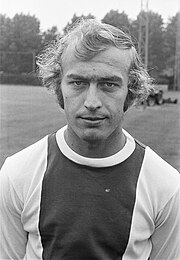Horst Blankenburg
 Blankenburg as player of Ajax in 1972 | |||
| Personal information | |||
|---|---|---|---|
| Full name | Horst Blankenburg | ||
| Date of birth | 10 July 1947 | ||
| Place of birth | Heidenheim, Germany | ||
| Height | 1.81 m (5 ft 11 in) | ||
| Position(s) | Defender, Sweeper | ||
| Youth career | |||
| VfL Heidenheim | |||
| Senior career* | |||
| Years | Team | Apps | (Gls) |
| 1967–1968 | 1. FC Nürnberg | 0 | (0) |
| 1968–1969 | Wiener Sportclub | 27 | (0) |
| 1969–1970 | TSV 1860 München | 31 | (1) |
| 1970–1975 | Ajax | 188 | (5) |
| 1975–1977 | Hamburger SV | 44 | (0) |
| 1977–1978 | Neuchâtel Xamax | 19 | (0) |
| 1978–1980 | Chicago Sting | 38 | (0) |
| 1979–1980 | → KSC Hasselt (loan) | 10 | (0) |
| 1980–1982 | Preußen Münster | 22 | (0) |
| 1982–1983 | Hummelsbütteler SV | ||
| 1985 | Lüneburger SK | 12 | (0) |
| *Club domestic league appearances and goals | |||
Horst Blankenburg (born 10 July 1947) is a former German footballer, who played as a sweeper.[1] He is best known for the early 1970s period, during which he played for Ajax Amsterdam and won the European Cup three times (1971, 1972, 1973), the European Super Cup twice (1972, 1973), the Intercontinental Cup once (1972) and the Dutch championship and the KNVB Cup twice. In 1976, he won the German Cup and the European Cup Winners' Cup in 1977 with Hamburger SV. He was never selected for the German national team.
Playing career
Blankenburg's career began in the youth team of VfL Heidenheim; his professional career began at 1. FC Nürnberg under Max Merkel in the 1967–68 season. Nürnberg won the Bundesliga in that season, even though his contribution consisted of only 13 games, none of them league matches. He then transferred to Wiener Sportclub in Vienna for 45,000 German marks, where he managed to impress. After the season, he switched to TSV 1860 München for 100,000 German marks. In that season, he had 31 appearances and even scored one goal, but his team was relegated, he moved on to Ajax Amsterdam in the Netherlands.
Ajax Golden Era
He played together with Johan Cruyff, Johan Neeskens, Ruud Krol, and Arie Haan. His coaches at Ajax were Stefan Kovács and Rinus Michels, who designed the famous Dutch offside trap around him and Velibor Vasović. Blankenburg was Ajax's team sweeper and was widely considered to be one of the best in Europe. In the five seasons at Ajax he won the European Cup three years in a row between 1971 and 1973 and the Intercontinental Cup in 1972. He became Dutch champion in 1972 and 1973 and won the Dutch Cup in 1971 and 1972.
Hamburger SV
In 1975, he returned to Germany to play for Hamburger SV. Under Kuno Klötzer, he won the German Cup in 1976 and the UEFA Cup Winners' Cup in 1977, although he did not get to play in the final against RSC Anderlecht. In the end, he could not assert himself at the club – during his second season at the club he only played 13 league matches, so he was transferred at the end of that season to Neuchâtel Xamax in Switzerland. In 1978, Blankenburg moved to Chicago Sting in the United States, before being loaned out for a few months to KSC Hasselt in Belgium. He retired from professional football in 1981 at Preußen Münster. However, in 1982 he moved to lower league teams Hummelsbütteler SV and Lüneburger SK, where he finally ended his career in 1985, aged 38.
National team
He was never selected for the German national team, one of the reasons being that the outstanding Franz Beckenbauer fulfilled the role of libero there at the time. Johan Cruijff asked him to play for the Netherlands in the 1974 World Cup but Blankenburg refused, he was still hoping for selection from his homeland.[2]
Honours
- Bundesliga winner: 1967–68
- Eredivisie Winner: 1971–72, 1972–73
- KNVB Cup Winner: 1970–71, 1971–72
- European Cup Winner: 1970–71, 1971–72, 1972–73
- European Super Cup Winner: 1972, 1973
- Intercontinental Cup Winner: 1972
- DFB-Pokal Winner: 1975–76
- European Cup Winners' Cup Winner: 1976–77
References
- ^ "Blankenburg, Horst" (in German). kicker.de. Retrieved 30 December 2010.
- ^ Glauche, Peter (24 April 2005). "Große Ehre für einen fast vergessenen Fußball-Helden". Die Welt (in German). welt.de. Retrieved 30 December 2010.
External links
- Horst Blankenburg at fussballdaten.de (in German)
- Horst Blankenburg at WorldFootball.net
- NASL Stats
- Use dmy dates from June 2013
- 1947 births
- Living people
- German footballers
- Association football sweepers
- 1. FC Nürnberg players
- TSV 1860 Munich players
- AFC Ajax players
- Hamburger SV players
- Neuchâtel Xamax FCS players
- SC Preußen Münster players
- Chicago Sting (NASL) players
- Bundesliga players
- 2. Bundesliga players
- Eredivisie players
- North American Soccer League (1968–1984) players
- Belgian First Division A players
- German expatriate footballers
- German expatriate sportspeople in Austria
- Expatriate footballers in Austria
- German expatriate sportspeople in the Netherlands
- Expatriate footballers in the Netherlands
- Expatriate footballers in Belgium
- German expatriate sportspeople in Switzerland
- Expatriate footballers in Switzerland
- Expatriate soccer players in the United States
- Wiener Sport-Club players
- UEFA Champions League winning players
